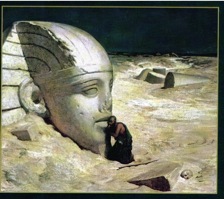The bulk of his argument centered around a Wednesday-crucifixion concept as the method to explain the discrepancy of 3 days and 3 nights.
First, some background. A Jewish "day" begins at sundown and lasts until the next sundown. This is why weekly Sabbath celebrations begin at sundown on Friday and last until sundown on Saturday. In addition to the weekly Sabbaths, Judaism calls for certain other days in the year to also be considered Sabbaths. Two of these are found in the Feast of Unleavened Bread, on the first and seventh days. Thus, the Wednesday-crucifixion propoents state that Jesus died on a Wednesday, during the afternoon, and was buried before sundown, which would be the beginning of the Feast of Unleavened Bread Sabbath.
This argument was also made by an Anonymous commenter to the previous article on the subject.
On its surface, this argument would appear to solve the whole problem:
Wednesday night= 1 night
+
Thursday "day"= 1 day
+
Thursday night= 1 night
+
Friday "day"= 1 day
+
Friday night= 1 night
+
Saturday "day"= 1 day
____________________
Total= 3 days, 3 nights
+
Thursday "day"= 1 day
+
Thursday night= 1 night
+
Friday "day"= 1 day
+
Friday night= 1 night
+
Saturday "day"= 1 day
____________________
Total= 3 days, 3 nights
We are to apparently disregard the portion of Wednesday "day" that he was also dead. Additionally, sundown on Saturday ended that day and began the first day of the week, thus he could rise anytime after sundown and it works.
Keep in mind, this only works if, indeed, Jesus was killed on the Preparation Day prior to the Feast of Unleavened Bread Sabbath, which is the first day of that celebration. The Bible even seems to back it:
John 19:14This would mean the other references to him being killed on the Preparation day for the Feast's Sabbath also line up.
14And it was the preparation of the passover, and about the sixth hour: and he saith unto the Jews, Behold your King!
There is just one tiny little problem.
Jesus was alive and well on the first day (Sabbath) of the Feast of Unleavened Bread.
Matthew 26:27
17Now the first day of the feast of unleavened bread the disciples came to Jesus, saying unto him, Where wilt thou that we prepare for thee to eat the passover?
Mark 14:12
12And the first day of unleavened bread, when they killed the passover, his disciples said unto him, Where wilt thou that we go and prepare that thou mayest eat the passover?
So, not only was Jesus alive, he had not even been arrested or charged when the first day of the Feast of Unleavened Bread had arrived. In fact, the previous day would have been the Preparation day the Wednesday-crucifixion proponents center around.
Keeping in mind that same Jewish measurement of days, the above two passages would have occurred sometime between sundown of the previous day and sundown of their current day. Discrepancies of note are the references to the slaughtering of the Passover lamb as occurring on the same day as the first day of the Feast. This was usually done the preceding day, as the Sabbath laws forbid slaughtering animals. The Jewish dates for these events are 14 Nisan, Passover, and 15 Nisan, the first day of the Feast.
This means that even if we allow the above two passages to be set on the day before the Feast, they still put Jesus as being alive and free on the Preparation day and before being arrested, charged, tried, and executed by the authorities.


2 comments:
http://amazingfacts.org/items/Read_Media.asp?ID=653
Heart of the earth doesn't just mean buried.
Sure it does. This is just another example of picking and choosing what is literal and what is metaphorical just so things line up logically. Christians will go to tremendous logical leaps and twists to make things fit instead of just admitting the obvious: the Gospel writers didn't always self-agree and they largely inserted their own ideas into whatever narrative they were attempting to tell.
Post a Comment